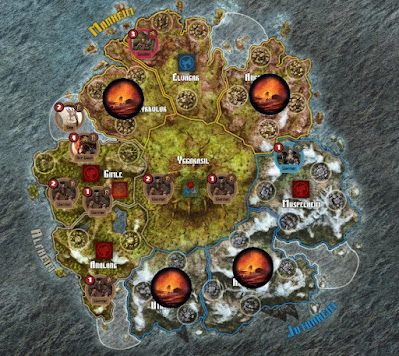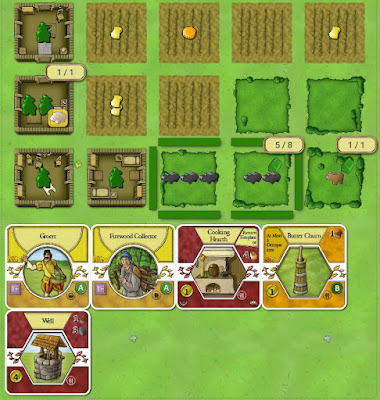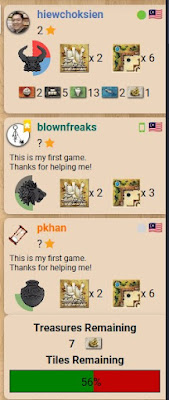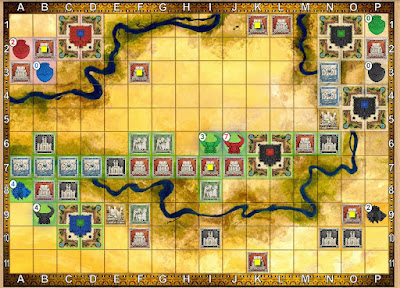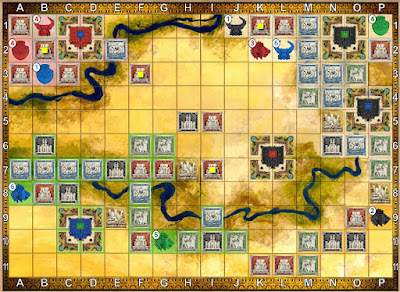Sunday, 31 August 2025
clearing my game collection
Saturday, 23 August 2025
boardgaming in photos: Taiwan trip, Elfenland, Pax Renaissance
Wednesday, 30 July 2025
boardgaming in photos: Jaipur, Blood Rage, Agricola, Caverna, Puerto Rico
These are some older boardgames which I recently played with my old friends Allen and Han, all played on BoardGameArena.com.
Jaipur is a 2-player card game. It has been a while, but the game is still as enjoyable as I remember. It is always tempting to take multiple cards from the centre row, but then you are always anxious whether the new cards which refill the row present an even better opportunity to your opponent. There is always the tension of collecting more to redeem a greater reward, or redeeming quickly before the juiciest rewards are claimed by your opponent.
Blood Rage is my weakness. I really suck at playing this game. We've played this some years ago, and I did poorly. Now, I am doing just as poorly, if not worse. It isn't really a complex game. I have no idea why I can't even play this half decently. I think I have some kind of mental block when it comes to this game. It's not because of the battle theme. I'm not against wargames. I have no idea why.
I had played a lot of Agricola in the past, but it had been a while, so I was a little rusty. This was my farm in the early game. I had two cattle, but I couldn't breed them because I did not have enough space. In fact the cow had to live inside my house. Not exactly hygienic.
Caverna is a reimplementation of Agricola. Some aspects were changed and simplified, several things were added. This was the early game.
Sunday, 20 July 2025
boardgaming in photos: Five Tribes, Tigris and Euphrates, Parks, Troyes, In the Year of the Dragon
Han, Allen and I continue to play in asynchronous mode on BoardGameArena.com. We play a mix of new-to-us and older games. However most of the games we have played before were played many years ago. In most cases I have forgotten the rules and I need to learn all over again anyway. So it is almost like every game is new to me. Five Tribes is one of these which I have to relearn.
This was one funny match. As we played, I felt that Allen played well, and I played horribly. I did not manage to get even one djinn. In Five Tribes, djinns are powerful and should not be neglected. Allen felt the same about our game. When the game ended, we were both surprised that I won. Scores were not revealed throughout the game and we only knew when the game ended. The only reason I won was I had been thrifty when bidding for turn order. When the game ended, I had much more money left than either of them. Money was points. I did poorly during the game because I was often last in turn order, and there weren't many profitable things left to do on the board by the time it was my turn. I saved money, but missed out on opportunities. We all underestimated the power of saving money.
The first time I played PARKS it was a physical copy. That time I didn't find it particularly interesting. Now that I have played it again, I find it a pleasant light strategy game. It is still another game about collecting resources and fulfilling contracts, but what I should focus more on is the central hiker movement mechanism. That is something innovative. It creates that dilemma of whether you want to rush ahead to grab a choice spot, or you want to go slow and claim many resources.
Tigris & Euphrates was once the #1 game on BGG. Many say it is the most important work of Reiner Knizia. I have the physical game, but it had been a while since I last played. Playing this again reminded me of what a wonderful design this is. In the past I often felt scared about this game, because I wasn't exactly sure what I was doing, and I often did poorly. Now I am more comfortable with it, even though I still see it as a ruthless game.
In our game a large kingdom soon emerged at the bottom left. In Tigris & Euphrates, kingdoms don't belong to any one player. Kingdoms are but tools for players to score points. Everyone has four different leaders who can be deployed to the various kingdoms. When kingdoms thrive in an aspect associated with a leader, that leader scores points for the player. You have four leaders, each in a different colour. You also score points in four different colours. Your final score is your weakest colour. So this is a game about scoring evenly. Having many points in a single colour doesn't help.
Connected tiles form kingdoms. When two kingdoms touch, they go to war. Wars are resolved based on the four different colours separately. A war only happens if in both the kingdoms there are leaders of the same colour. If none of the leader colours overlap between the two kingdoms, there is no war, just a peaceful unification.
Due to one early war I earned many green points. For the moment I didn't need to worry about green and I needed to work on my other colours.
It is important to utilise monuments to earn points. Monuments give you a stable point income. Tigris & Euphrates is a game with danger lurking behind every corner. Kingdoms are often on the brink of war. Even if you are a powerful leader in a large kingdom, you never know when an usurper will show up and attempt to overthrow you. While watching out for both external and internal conflicts, you also need to plot to use these same methods to attack your opponents and gain points for yourself.
When the final scores were revealed, Han won by a large margin. Scores are kept hidden throughout the game. You know roughly who is doing well and who is not, but you won't know exactly who is leading. Technically you can keep track of this, but normally no one has the patience for this.
Stefan Feld is a hugely popular game designer, but instead of his most popular titles, one of his games which I like is In the Year of the Dragon. I remember it as a game with much suffering. Every round bad things happen and you lose people, or you lose money, or your buildings crumble, which can lead to losing more people because you can't house them. You do your best to survive and mitigate the suffering.
This time playing the game, it was less painful than I am normally used to. It was because I was lucky to be the start player, and I managed to maintain initiative for most of the game. Having high initiative is very useful because every round you'll get to choose an action first, which means you can pick anything. Subsequent players who want to pick an action that has been picked will have to pay. The fee is steep. Money is hard to earn (just like in real life). But sometimes you are desperate enough to want to pay that price. Having high initiative makes life much, much easier. It also helped that despite not playing the game for some time, I still remembered the general strategy - watch out for all the bad things coming and prepare early for them.


























